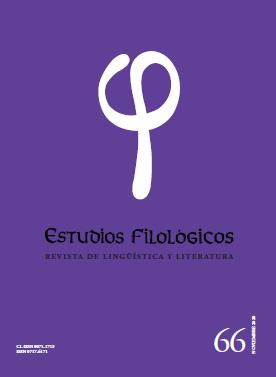‘Heterowingka patriarchy of wages’ in Desde el fogón de una casa de putas williche (2010) by Graciela Huinao. An intersection of gender, ethnicity, class and race
Main Article Content
Abstract
The aim of this article is to analyze Graciela Huinao's novel Desde el fogón de una casa de putas williche (2010) from an intersectional prism of gender, class, ethnicity and race. In this work a mapuche brothel is presented in a border territory between the wingka and the mapuche world, in this space the women are in charge of the administration, generating a place of relative autonomy in the middle of the state and wingka violence that meant the occupation of their territories. Our hypothesis of reading is that this work can be read in the context of a patriarchal junction, between the Mapuche patriarchy and the wingka. The junction consolidates, through violence a 'heterowingka patriarchy of salary', against which, the brothel is established as a space for opposition and subversion that disjoint the wingka and mapuche patriarchal logic.

